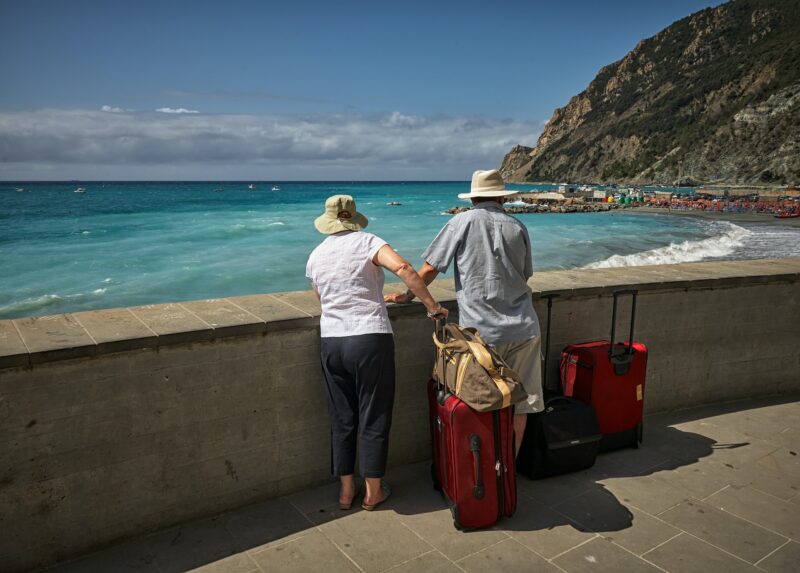
Have you dreamed of traveling the world, seeing the sights, and embarking on a food and cultural adventure?
Do not be discouraged by your years! While traveling as a senior will require additional planning, it offers a lot of benefits that can enhance your quality of life in your golden years. With adequate preparation, you can enjoy traveling and make more memories, no matter the season.
Why travel?
Here are some reasons why travel is good for seniors; all of these reasons, collectively taken, contribute to a better mood and overall happiness and well-being.
1. Physical activity: Travel usually involves walking as you explore your destination, and walking is a gentle form of exercise for mobility and general health.
2. Cognitive stimulation: Exposure to new environments can keep your mind sharp, as well as learning about different customs, history, and languages. It also fosters continued learning and curiosity and provides a deeper appreciation for the world’s diversity.
3. Social engagement: Travel also can offer you the opportunity to meet new people. These social interactions can keep feelings of loneliness and isolation at bay.
4. Stress reduction: A change of scenery and a break from daily routines can reduce stress levels and can be good for your mental health.
5. Maintaining independence: For elderly people who are still relatively independent, traveling can reinforce their autonomy and self-sufficiency and give them some sense of accomplishment.
6. Strengthening relationships: If you travel with friends and/or family, you will certainly create lasting memories with your loved ones. These shared experiences are good for bonding and fostering relationships.
Planning your trip
Now that we’ve talked about the benefits of traveling, here are some tips to make sure you have a safe and enjoyable trip.
1. Check with your doctor. Before planning to go on a trip, especially if it involves strenuous physical activity or long flights, it is best to confirm that you’re in good health and fit to travel.
2. Plan your trip in advance. This involves creating a detailed itinerary and making reservations ahead for stays and transport. This is to avoid the stress of last-minute arrangements and to ensure you have comfortable accommodations.
3. Get travel insurance. Make sure you have comprehensive travel insurance that can cover any medical emergency, trip cancellation, and lost luggage.
4. Choose the right destination. Consider destinations that are friendly to elderly people and are fairly accessible, without extreme weather conditions or physically challenging terrain.
5. Pack wisely. Consider packing lightly (what you can carry), and include important medications, comfortable clothing and walking shoes, and other medical or travel documents you may need during your trip.
6. Take breaks. During the trip, whether you are traveling by land, air, or see, keep hydrated and take frequent breaks to prevent overfatigue. Especially when flying for longer periods, keep ambulating to prevent deep vein thrombosis (blood clots).
7. Bring your mobility and other personal aids. If you need mobility aids like canes, walkers, or wheelchairs, make sure to bring them along to help you ambulate on your trip. Most places nowadays are accessible for these. Don’t forget hearing aids and eyeglasses too!
8. Secure your belongings. Be careful about your luggage and personal items, especially in crowded tourist spots. Photocopy your travel documents and keep extra copies in different places. You may want to use a belt or neck pouch or wear your backpack on your front to keep important items close to your body.
9. Be careful with physical activities. Know your limitations so that you don’t overexert yourself. Engage only in activities that are suitable for your physical fitness is wise. Make sure to also let your travel companions and guides about any possible health concerns, so they can look out for you.
10. Stay connected. Have a handy list of important contact numbers, including emergency contacts and the information about your local embassy or consulate. It may be cheaper to have an open phone line and buy a local SIM card with some data, so you can stay connected to family and friends. You can also use your phone as your map, to check out restaurants and attractions, and stay updated on possible changes in travel plans.
Another important thing to remember is, no matter your age, to simply stay open to new experiences! Embrace the joy of discovering new places, tasting new food, encountering new cultures, and meeting new people.
Takeaway
It can seem daunting to travel as an elderly person, whether solo or in a group. But travel can be good for you, and as long as you prepare accordingly, your trip can run as smoothly as possible.
Vancouver is a great, friendly place for seniors to visit, with a multitude of naturally beautiful locations and cultural sites. Should you need companion care on your next trip here, contact us for a personalized care plan, adapted to your health needs and preferences.
So go ahead: book your next adventure!



